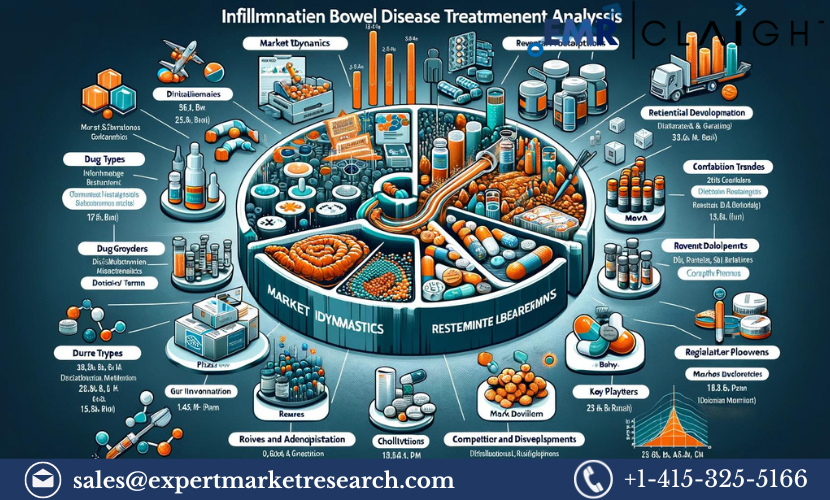The Inflammatory Bowel Disease (IBD) treatments market is rapidly evolving. With increasing disease prevalence, advancements in biotechnology, and new regulatory frameworks favoring biosimilars, this market is set for significant growth over the next decade. Below, we delve deeper into the core trends shaping this sector, offering an in-depth understanding of where the industry is headed and how key players are positioning themselves for success
1. Surge in IBD Prevalence
The rising prevalence of IBD, including Crohn’s disease and ulcerative colitis, is one of the most critical factors driving market growth. The number of people diagnosed with IBD is growing, especially in developed regions such as North America and Europe.
- Why the increase?
Experts suggest several factors contributing to the surge, including:- Environmental factors: Diets rich in processed foods, pollution, and antibiotic overuse.
- Genetic predisposition: While not fully understood, certain populations are more prone to developing IBD.
- Gut microbiome disruption: Changes in gut bacteria due to antibiotics, diet, or infections can trigger inflammation.
As IBD prevalence rises, there’s an increasing demand for effective long-term management options, contributing to market expansion.
2. Growth in Biologics and Targeted Therapies
The shift from conventional treatments, such as corticosteroids and immunosuppressants, to biologics and targeted therapies is revolutionizing IBD treatment.
- Biologics:
These are advanced drugs created from living organisms (cells or tissues) that target specific pathways in the immune system, reducing inflammation at the source.- Examples of biologics: Tumor necrosis factor (TNF) inhibitors like Remicade (infliximab), Humira (adalimumab), and newer integrin and interleukin inhibitors such as Stelara (ustekinumab).
- Targeted Therapies:
Companies are now developing small molecule drugs like JAK inhibitors, which are more selective in modulating immune pathways and provide better outcomes with fewer side effects.- Tofacitinib (Xeljanz) by Pfizer is one such JAK inhibitor, approved for treating ulcerative colitis.
- Why are biologics key?
The long-term use of traditional medications often causes side effects like immune suppression and infection risk. In contrast, biologics offer precision, targeting specific immune pathways with a lower risk of adverse effects, and have shown better outcomes in disease remission.- Market potential: The biologics segment is expected to see exponential growth as healthcare providers move toward advanced, targeted therapies for managing chronic diseases like IBD.
3. Biosimilars Gaining Traction: An Affordable Alternative
As patents for many biologics expire, the door is wide open for biosimilars—nearly identical copies of biologic drugs that are significantly cheaper.
- Biosimilars vs. Biologics:
While biologics are expensive due to their complex production, biosimilars can offer 30-40% lower prices, making them a highly attractive option for both patients and healthcare systems. - Notable Examples:
- Inflectra (a biosimilar to Remicade).
- Amjevita (biosimilar to Humira).
- European Success:
Europe has led the way in adopting biosimilars, primarily due to strong regulatory support. The European Medicines Agency (EMA) has been approving biosimilars at a fast pace, allowing companies like Mylan N.V. to penetrate the market with affordable alternatives.
- Impact in Emerging Markets:
In regions like Asia-Pacific and Latin America, biosimilars offer immense growth potential. With healthcare budgets limited, biosimilars allow these regions to access advanced therapies at a fraction of the cost.
4. Personalized Medicine: The Future of IBD Treatment
Personalized medicine refers to the customization of healthcare—especially medical treatment—based on an individual’s genetic profile, environment, and lifestyle. This trend is gaining momentum in IBD treatment due to the variability in how patients respond to medications.
- Biomarker Identification:
Researchers are working to identify biomarkers that predict how a patient will respond to certain treatments. This helps in designing treatment plans tailored to an individual’s specific immune response and disease progression. - Potential Impact:
Personalized approaches can significantly improve treatment outcomes. For example, if biomarkers predict a poor response to TNF inhibitors, a patient can be started on integrin inhibitors or JAK inhibitors right away, avoiding unnecessary delays in effective treatment. - Precision Treatment:
Instead of the traditional “trial-and-error” approach, where patients might cycle through several drugs before finding the right one, personalized medicine aims to deliver the right drug the first time, improving remission rates and reducing side effects.- Pharmaceutical Leaders:
Companies like Pfizer and GSK are heavily investing in personalized medicine by conducting trials that aim to correlate genetic markers with drug efficacy. This investment is likely to drive innovation in treatment approaches in the coming decade.
- Pharmaceutical Leaders:
5. Investment in Research & Development (R&D)
As the market becomes more competitive, companies are investing heavily in R&D to discover new therapies that address unmet needs in IBD treatment. Some key areas of R&D include:
- Immune-Modulating Therapies:
Researchers are exploring drugs that modulate the immune system’s response without suppressing it entirely, thereby reducing side effects like infections. - Oral Biologics:
The development of oral versions of biologics (typically administered through injections or infusions) is a significant area of research. Takeda is one such company working on oral therapies for Crohn’s disease and ulcerative colitis. - Novel Therapeutic Targets:
Companies are targeting new biological pathways to provide relief for patients who do not respond to current treatments. These include therapies focusing on microbiome modulation and stem cell-based treatments. - Strategic Partnerships and Acquisitions:
In the quest for innovation, pharmaceutical companies are increasingly forming partnerships with biotech firms or acquiring smaller companies with promising research pipelines. This is enabling faster development and commercialization of novel therapies.
6. The Role of Strategic Initiatives
Strategic initiatives, including mergers and acquisitions, partnerships, and licensing agreements, are shaping the future of the IBD treatment market. Leading companies are expanding their reach by collaborating on research, pooling resources, and gaining access to innovative technologies.
- Pfizer’s Strategic Moves:
Pfizer has been actively entering into collaborations and partnerships to enhance its biologics pipeline for IBD treatment. These strategic moves enable the company to access advanced technologies and diversify its product portfolio. - Novartis and GSK’s Focus on R&D Partnerships:
Novartis and GSK are investing in long-term R&D partnerships with academic institutions and biotech firms, focusing on developing novel therapies that target the root causes of IBD.









